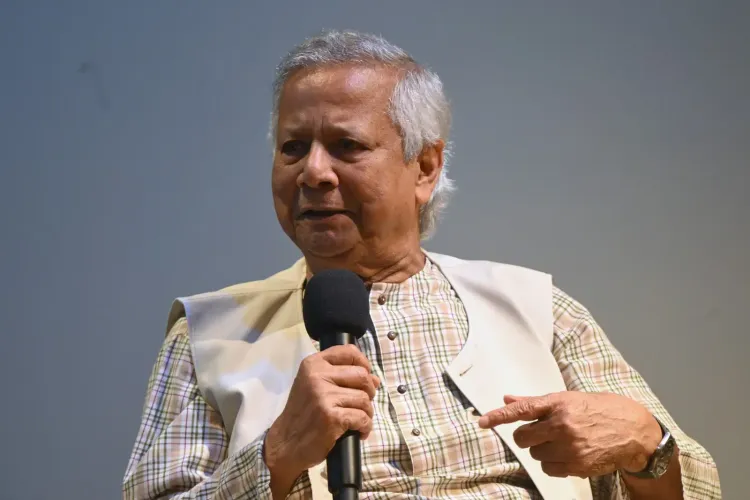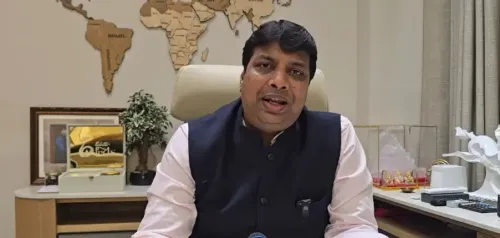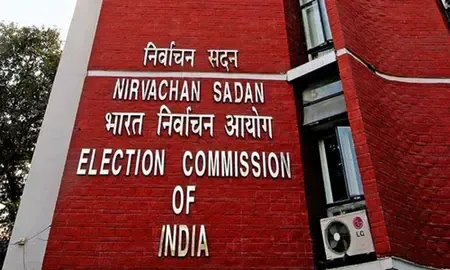Is Yunus Really Just Blaming India Amidst Minority Persecution in Bangladesh?

Synopsis
Key Takeaways
- Yunus's accusations against India raise questions.
- Bangladesh sees alarming persecution of minorities.
- Jamaat-e-Islami's role is significant in targeting minorities.
- International response to abuse remains inadequate.
- Systematic violence has surged post-Hasina's leadership.
New Delhi, Sep 26 (NationPress) During his address at the United Nations General Assembly (UNGA), Bangladesh’s interim chief advisor Muhammad Yunus dedicated a significant portion of his speech to criticizing India for the current tensions between the two nations. He accused India of providing refuge to Sheikh Hasina, who he claims is responsible for the ongoing issues.
As Bangladesh grapples with a disturbing rise in the persecution of minorities, the government has leveled accusations against Hasina for committing crimes against humanity. Despite requests for her extradition, India has yet to address the situation.
The claims made by Yunus coincide with alarming reports of escalating violence against minorities in Bangladesh. Following Hasina’s exit from power and Yunus's ascent, there has been a marked increase in persecution targeting minorities, particularly Hindus, instigated by radical Islamist groups.
During the 60th session of the United Nations Human Rights Council (UNHRC), Charlotte Zehrer, a UN-EU Human Rights Officer from Global Human Rights Defence (GHRD), highlighted the dire circumstances faced by ethnic and religious minorities in Bangladesh.
She reported various forms of abuse, including assaults on homes and places of worship, gender-based violence such as rape, false blasphemy accusations, land confiscation, forced displacement, and arbitrary arrests.
“Achieving justice for minorities in Bangladesh is not solely a national duty but also an international responsibility,” Zehrer emphasized.
Despite repeated inquiries from India, there has been no substantial response or action from Yunus.
Officials assert that the persecution is systematic rather than random. It was largely contained during Hasina's leadership, but has surged dramatically since her removal.
Intelligence agencies have reported credible evidence indicating that the persecution is being orchestrated. This mirrors the situation in Pakistan, where there is a concerted effort to eliminate every minority group. Notably, the Jamaat-e-Islami party has long aimed to transform Bangladesh into a wholly Islamic nation.
The Jamaat, a dominant force in Bangladesh, has pressured the government to release Mufti Jashimuddin Rahman, the leader of the Ansarullah Bangla Team (ABT). Following his release, he incited violence against Hindus in Bangladesh, even suggesting that the ABT, allied with Al-Qaeda, should extend its focus to West Bengal after targeting Bangladesh.
Once the new regime assumed power, the ISI quickly resumed its longstanding agenda of eliminating minority groups in Bangladesh. Yunus's alignment with Pakistan has facilitated the implementation of this plan.
Officials indicate that the Jamaat and ABT have formed teams specifically tasked with targeting minorities. Those in advantageous positions face imprisonment, while others are subjected to violence. Indian agencies have discovered that these teams are instructed from high levels to systematically target minorities.
Furthermore, police and law enforcement agencies are often instructed to ignore such atrocities. Statements from figures like Rahman not only signal a perilous trend in Bangladesh but also suggest intentions to provoke communal unrest in India. This reflects the broader strategy of the ISI and Jamaat, while the Muhammad Yunus administration appears to be taking no action.









